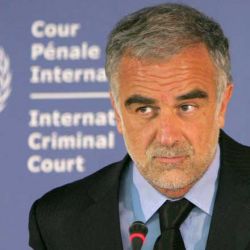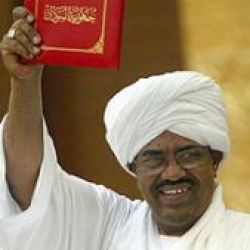 Moreno-Ocampo, right, added that since his last report in June, there had been positive developments. Judicial proceedings in relation to Darfur were progressing and cooperation with other international bodies had been fruitful. States and international organizations had maintained consistent support for the execution of the International Criminal Court’s arrest warrants. He noted that rebel leader Bah Abu Garda, allegedly responsible for killing and injuring peacekeepers during the September 2007 attack of the African Union Mission in the Sudan in Hakanita, had voluntarily appeared before the Court.
Moreno-Ocampo, right, added that since his last report in June, there had been positive developments. Judicial proceedings in relation to Darfur were progressing and cooperation with other international bodies had been fruitful. States and international organizations had maintained consistent support for the execution of the International Criminal Court’s arrest warrants. He noted that rebel leader Bah Abu Garda, allegedly responsible for killing and injuring peacekeepers during the September 2007 attack of the African Union Mission in the Sudan in Hakanita, had voluntarily appeared before the Court.
Mr. Moreno-Ocampo said he had cooperated with the African Union High-level Panel on International Criminal Court activities and crimes committed in Darfur, which had adopted a comprehensive solution, combining the current Court cases with the possibility to have other courts for other perpetrators, if and when the conditions for such courts to operate effectively were created.
 Pointing out that President Al Bashir, left, at risk of arrest, had not travelled to the territory of Rome Statute States parties for high-level events, which he had been planning to attend, he said that such marginalization of indicted criminals, if maintained steadfastly, was a way towards the ultimate implementation of the arrest warrants. President Al Bashir had refused cooperation with the Court and had also endeavoured to shift the international community’s attention to new issues, such as the conflict with the South. "President Al Bashir will exacerbate such conflict if it can shift your attention from the crimes committed in Darfur", he warned Council members.
Pointing out that President Al Bashir, left, at risk of arrest, had not travelled to the territory of Rome Statute States parties for high-level events, which he had been planning to attend, he said that such marginalization of indicted criminals, if maintained steadfastly, was a way towards the ultimate implementation of the arrest warrants. President Al Bashir had refused cooperation with the Court and had also endeavoured to shift the international community’s attention to new issues, such as the conflict with the South. "President Al Bashir will exacerbate such conflict if it can shift your attention from the crimes committed in Darfur", he warned Council members.
His Office continued to review information in such areas as acts against civilians in the camps, including rapes, by the forces of President Al Bashir, and the use of child soldiers both by the Sudanese armed forces and the rebels, he said. His Office was also considering the criminal responsibility of Sudanese officials who actively denied and dissimulated crimes.
‘As the Prosecutor, my mandate is to investigate and prosecute those responsible for crimes to contribute to the prevention of future crimes. I am ready to answer any challenge in Court, but I will need the full support of the Council to contribute to end the current crimes against the people from Darfur’, he said in conclusion.
In the ensuing debate, speakers underlined that the Sudan was under a legal obligation to cooperate with the International Criminal Court, as stipulated by Council resolution 1593 (2005), and called on all parties to provide full cooperation with the Court, including in executing its arrest warrants. The representative of the United States urged all States, including those not party to the Rome Statute, to refrain from providing political or financial support to indicted suspects. She added that her country, although not party to the Rome Statute governing the International Criminal Court, would continue to be supportive of the Court in ways consistent with United States domestic law.
The representative of Burkina Faso, however, expressed concern at the warrant issues against President Al Bashir, a concern echoed by members of the League of Arab States, the African Union, the Organization of the Islamic Conference and the Non-Aligned Movement. Although combating impunity was an indispensable factor for the return of a sustainable peace to Darfur and the whole of the Sudan, he said the objective of justice could not, in and of itself, bring peace in such a complex conflict without a political solution based on consensus. He demanded that the prosecution of President Al Bashir be suspended, in conformity with article 16 of the Rome Statute.
In contrast, the representative of Costa Rica pointed out that any Member State should respect the provisions of the United Nations Charter and Council resolutions adopted under Chapter VII. The Sudanese Government, however, had ignored the decisions of the Council without any consequence, and the Council, through its tolerant attitude, had contributed to eroding trust in international justice.
Echoing other speakers, France’s representative stressed that there was no contradiction between justice and peace, but that combating impunity was a condition for lasting peace. Although the Rome Statute allowed for the Council to suspend investigation for one year, that provision should only be used when required by security, and never to allow impunity for crimes before the Court.
Many speakers welcomed the report of the African Union High-level Panel, which aimed to consider the interlinked matters of combating impunity and promoting peace and reconciliation. Uganda’s representative said, in that regard, that the report presented a good basis on which to resolve the outstanding impasse between the Sudan and the Court and strike a balance between upholding justice and ensuring peace and security in the Sudan. Welcoming the recommendations that called for the establishment of a hybrid court, he said that such a court should be constituted by Sudanese judges and judges from other nationalities, thereby allowing for independence of domestic jurisdiction in the Sudan.
Statements were also made by the representatives of the United Kingdom, Mexico, Russian Federation, Japan, the People´s Republic of China, Austria, Turkey, Croatia, Viet Nam and Libya…."
See full report: "Tenth report of the Prosecutor of the International Criminal court to the UN Security Council pursuant to UNSC 1593/2005," Office of the Prosecutor of the International Criminal Court, Statement delivered by Luis Moreno Ocampo, 4 December 2009
http://www.iccnow. org/documents/1401_001.pdf


